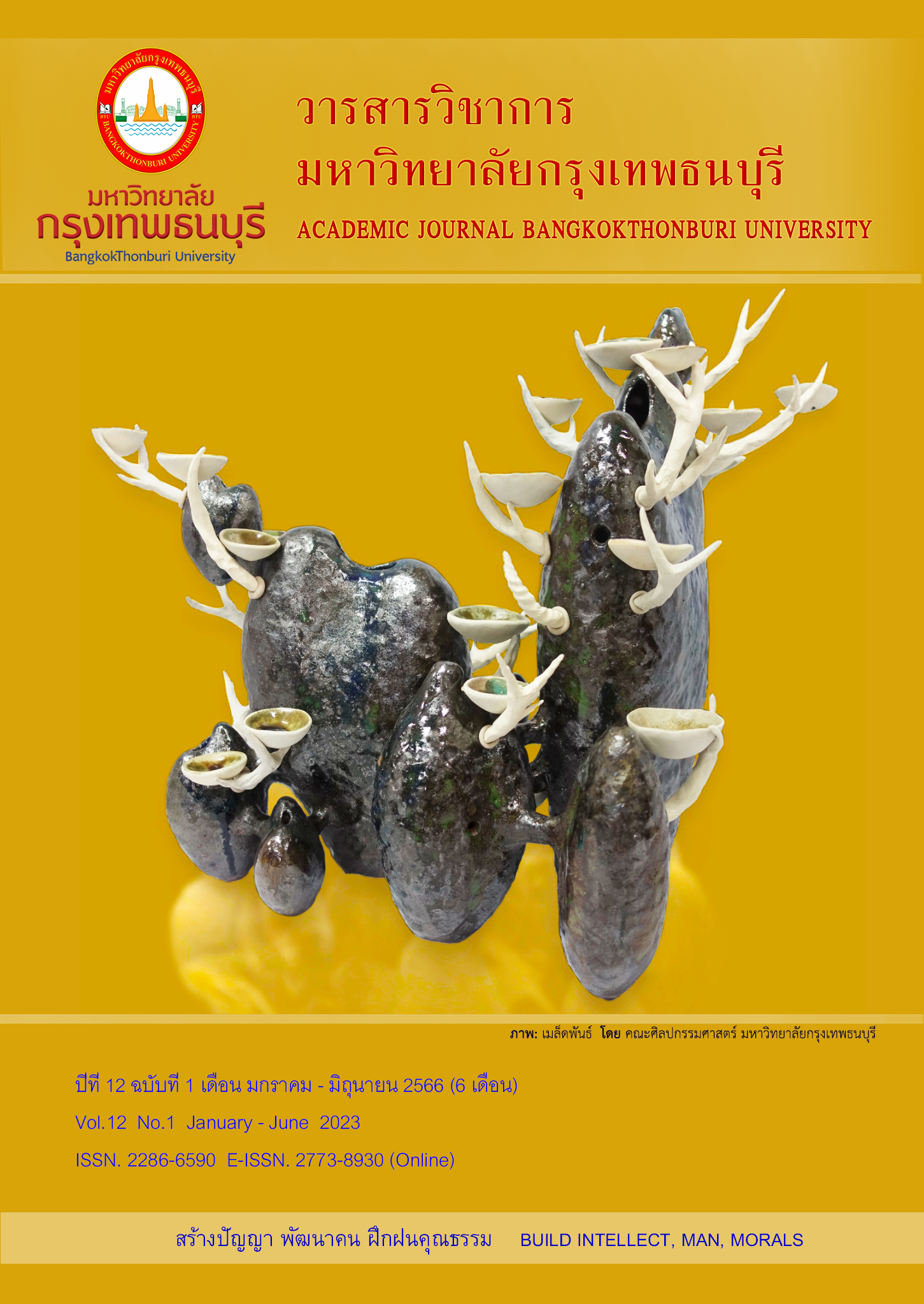Causal Relationship of Factors Influencing Performance of Organic Riceberry Rice Business Entrepreneurs in Thailand
Main Article Content
Abstract
The objectives of this research were 1) to study the factors influencing the performance of entrepreneurs of Organic Riceberry Production in Thailand 2) to analyze the relationship of the structural equation of factors influencing the performance of entrepreneurs 3) to develop a causal relationship model of factors influencing the performance of Organic Riceberry Production Entrepreneurs in Thailand.
This research was a mixed research by quantitative research using stratified random sampling from a population of 8,959 individuals. The sample size was determined according to the criteria of Hare et al. The sample group consisted of 597 enterpreneurs and executives, and a qualitative research using a random sampling of 12 people, including enterpreneurs and experts. The instrument used for data collection was a questionnaire. The statistics used in this research were percentage, mean, standard deviation and structural equation model analysis by Lisrel program.
The results of the research were found that (1) Factors influencing the performance of Organic Riceberry Production Entrepreneurs in Thailand were finance, customer service, internal process and learning and growth (2) knowledge management change leadership motivation to work and the ability to manage innovation. It has direct and indirect influence on the business performance of Organic Riceberry Production Entrepreneurs in Thailand. The index value c2 = 79.26, df = 13, c2/df = 2.530, p-value = 0.00000, NFI = 0.990, NNFI = 1.00, CFI = 0.77, GFI = 0.70, AGFI 0.79, RMSEA = 0.042, RMR = 0.030, SRMR = 0.0175 and (3) Causal relationship of factors influencing the performance of Organic Riceberry Production Entrepreneurs in Thailand. There is a connection and relationship building. innovation ability
Article Details

This work is licensed under a Creative Commons Attribution-NonCommercial-NoDerivatives 4.0 International License.
References
กรมพัฒนาธุรกิจการค้า กระทรวงพาณิชย์. (2564). สถานประกอบการผลิตข้าวไรซ์เบอรี่อินทรีย์. สืบค้นเมื่อ 15 มกราคม 2564 จาก https://www.dbd.go.th/index.php.
ลัดดาวัลย์ เพชรโรจน์ และอัจฉรา ชำนิประศาสน์. (2547). ระเบียบวิธีการวิจัย. กรุงเทพมหานคร: พิมพ์ดีการพิมพ์จำกัด.
ศูนย์วิทยาศาสตร์ข้าว มหาวิทยาลัยเกษตรศาสตร์. (2559). ข้าวกล้องไรซ์เบอร์รี่. นครปฐม: มหาวิทยาลัยเกษตรศาสตร์.
สำนักวิจัยเศรษฐกิจการเกษตร. (2564). สถานการณ์การผลิตและการตลาด. กรุงเทพฯ: มหาวิทยาลัยเกษตรศาสตร์.
Absael, A., Richard, L. H. & Norman, S. C. (2010). Understanding the process model ofleadership: Follower attribute design and assessment. Journal of College Teaching and Learning, 7(4), 6-9.
Amy, R. R. & Charles, L. M. (2008). Competing in the service sector-the entrepreneurial challenge. International Journal of Entrepreneurial Behaviour & Research, 7, 5-16.
Anna, M. (2009). The relationship between organizational learning and SME performance in Poland. Journal of European Industrial Training, 33(4),80-82.
Baek, K. J. & Sunyoung, P. (2010). Career satisfaction, organizational commitment, and turnover intention: The effects of goal orientation, organizational learning culture and developmental feedback. Leadership & Organization Development Journal, 31(6), 482-497.
Barrick, M. R., Piotrowski, M. & Stewart, G. L. (2002). Personality and job performance: Test of the mediating effects of motivation among sales representatives. Journal of Applied Psychology, 87, 43-51.
Cooper, D. R. & Pamela, S. S. (2008). Business research methods. New York: McGraw-Hill.
Graeme, D. L. (2010). Competitive strategy revisited: contested concepts and dynamic capabilities. Construction management and economics, 26(1), 63-78.
Kuittinen, H., Jantunen, A., Kyläheiko, k. & Sandström, J. (2008). The Many Facets of Uncertainty and the Structure of Cooperation. Management of Technology, 2, 21-35.
Mohammad, K. A., Rehana B. & Mohammed, F. R. (2013). Myofunctional Benefit of Tooth Brushing with Miswak: Electromyography and Magnetoencephalography Assessment. International Medical Journal, 20(2), 247-249.
Peter F. Drucker. (1995). Managing in a time of great change. New York: Truman Talley Books/Dutton.


